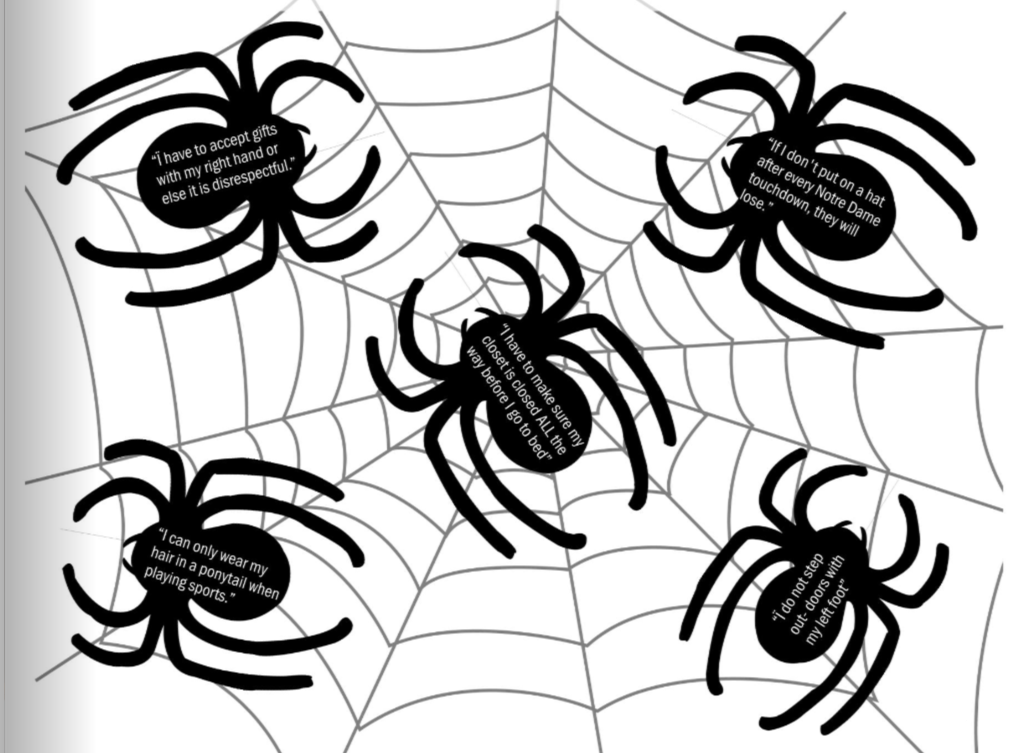Have you ever knocked on wood for good luck? Made sure to close your umbrella once you step inside after a rainy day? Refuse to take a test on Friday the 13th, despite the countless hours you studied?
Many students have superstitions that keep them confident and secure, but these superstitions can also affect us in the opposite way, sometimes tearing us apart. It is typical to succumb to these superstitions without even knowing the background of what some people believe to be foolish myths. Superstitions are beliefs or practices that individuals hold on to, even if new information has been found to prove those beliefs incorrect. There are various dark aspects to superstitions; in fact, people have even died due to extreme superstitions in brutal rituals and riots. The origins of superstitions, however, are not as spine-chilling as you may think.
Superstitions were not created out of thin air—far from it. As a matter of fact, the way most superstitions were created due to assumptions and a lack of education on certain subjects. Even so, we continue to allow these superstitions to determine the outcome of common events in our day-to-day lives.
Our first record of superstitions originated in ancient Greece in the fourth century BCE. They were embedded in cultural traditions, religious beliefs, and the natural environment around them. During this time, they were mainly used to describe “magic” and rituals. However, the meaning has significantly changed over time.
One example of an emerging superstition was in London. There were many hazards with opening doors while carrying an umbrella, such as accidentally hitting a small child or shattering an object, which therefore caused the superstition to emerge. Soon it became a bad omen to open umbrellas inside of buildings.
The bad luck of crossing paths with a black cat may have also originated in England. When King Charles I adopted a black cat as a pet, he was arrested the next day and charged with treason, leading the the thought that black cats brought bad luck. Furthermore, earlier during the Middle Ages, many people believed that black cats were the companions of witches, causing people to steer clear of the animals.
Why do we feel the need to obey these “silly” superstitions we have created in our society? It actually has much to do with their psychological impact. According to WebMD, the driving force behind superstitions is the want for certainty and control over what happens in our lives. To create this sense of control, we use the 3 steps of associative learning, conditioning, and reinforcement over time. Specifically, superstitions are powered by the placebo effect. For instance, if you act upon a superstition and it miraculously causes you to have good luck, you’ll likely repeat the behavior, convinced that it will help you again the next time.
Alternatively, superstitions can have a negative placebo effect. Severe addictions or anxiety patterns can develop due to beliefs in certain superstitions. Suppose you wish for an A on your latest history test but forget to knock on wood, so you end up receiving a failing grade. You’ll likely feel the need to knock on wood before the next test due to believing the bad grade was caused by the superstition.
Believing that you are in charge of your own fate in certain situations can be an immense confidence booster, which keeps us repeating the same superstitions over and over again. They can serve as a coping mechanism in response to the stressors and uncertainties that we encounter every day, giving us a fundamental sense of control over our lives.
We all have our own quirky superstitions that we believe in, and it is reassuring to know that we are not the only ones knocking on wood or refraining from stepping on cracks in the sidewalk. Famous celebrities such as Patrick Mahomes, Taylor Swift, and Stephen King have superstitions of their own. Surprisingly, Patrick Mahomes chooses to wear the same pair of red underwear for every NFL football game! Since Mahomes was gifted the pair of underwear, the Chiefs have won back-to-back Super Bowls. Not to mention, as most Swifties know, Taylor Swift says that 13 is her lucky number despite notoriously symbolizing bad luck. Ironically, writer Stephen King (“the king of horror”) is afraid of the number 13. Clearly, the meanings of superstitions can differ from person to person.
We asked the student body of SHS if they had any unique or obscure superstitions of their own. Here is what they shared:




![Mock Trial members from Gold and Green team last year pose for a picture in front of the OCLRE building in Columbus. "We all put in so much work [last] year. I know [this] year we’ll come back improved and ready to win!” said Ogunbodede.](https://shsleaf.org/wp-content/uploads/2025/10/IMG_4121-1200x822.jpg)






